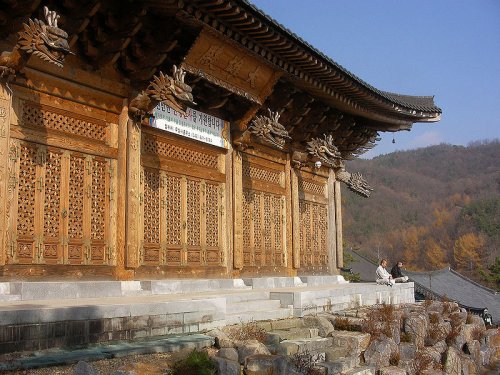Daejeon is the fifth largest city in South Korea. With a population of 1.4 million people, it is also the largest city in Chungcheong Province. Located 240 km (150 miles) to the south of Seoul, Daejeon is almost geographically at the center of South Korea, making it an ideal crossroad for several expressways and railways.
The name Daejeon means "large fields". The place has been known since the Joseon Dynasty (1392-1910), but the settlement was nothing more than a small village until 1905, when the Gyeongbu railway line passes through it between Seoul and Busan. Then in 1926, the Japanese occupational forces built the Honam railway line connecting it to Mokpo, turning Daejeon into an important transportation hub. The town grew rapidly from then on.
Today Daejeon is the second fastest growing city in South Korea behind Seoul. Some government offices were also relocated to Daejeon to escape the congestions of Seoul. The spillover of development from the capital city results in the construction of many new apartment complexes and high-tech industries in Daejeon.
Travel to Daejeon
The most convenient way to reach Daejeon for budget travelers is to take the train. The KTX high-speed train makes a journey from Seoul take a mere 50 minutes while from Busan 100 minutes. The more economical local train covers the same distance at twice the time.Apart from the train, you can also reach Daejeon from Seoul by express bus. There are a number of express bus terminals in the city, so it is advisable to find out when you purchase your bus ticket where the bus will be heading.
Travel within Daejeon
Daejeon's sole subway line, opened only in March 2006, runs from the southeast to the northwest of the city. You may still need to take the feeder buses from the subway stations to reach many of the sites of interest.Photos of Daejeon
 Musangsa Temple, Daejeon
Musangsa Temple, DaejeonSource: https://commons.wikimedia.org/wiki/File:Musangsa3.jpg
Author: Martin Röll

Author: Martin Röll

Places of Interest in Daejeon
- EXPO Park
Location of the 1993 Expo with many recreational activities. - Daedeok Science Town
Purpose-built town to support a research body. - National Science Museum
Scientific facility with the only world-class space-theater in Korea. - Hanbat Museum of Education
Museum housing over 6,000 educational material through the history of Korea. - Museum of Daejeon History
Museum established in 1991 to chronicle the history of the Daejeon area. - Currency Museum
Museum devoted to documenting the currency and postage stamps of Korea. - Dongsan Pottery Museum
Museum exhibiting earthenware from different times in history. - Daejeon Observatory
A place for visitors and enthusiasts to learn about astronomy and view celestial bodies such as planets and galaxies. - Daecheonghosu Lake
Lake in a picturesque setting surrounded by the mountains and trees, a water catchment for Daejeong. - Gyejoksan
Mountain with nice views of Daecheonghosu Lake. - Sikjangsan
The highest mountain in Daejeon at 624 meters, it has wonderful sceneries and historical relics. - Gubongsan
A beautiful 264-meter mountain with nine peaks. - Bomunsan
Mountain at the edge of Daejeon, with a height of 458 meters. - Jangtaesan
Mountain that is the first private natural forest in Korea. - Yuseong Spa
Therapeutic spa with healing waters for skin diseases and relief from stress.
 Latest updates on Penang Travel Tips
Latest updates on Penang Travel Tips
 Map of Roads in Penang
Map of Roads in Penang
Looking for information on Penang? Use this Map of Roads in Penang to zoom in on information about Penang, brought to you road by road.
Copyright © 2003-2025 Timothy Tye. All Rights Reserved.

 Go Back
Go Back